
Christopher Marlowe, also known as Kit Marlowe, was an English playwright, poet, and translator of the Elizabethan era. Marlowe is among the most famous of the Elizabethan playwrights. Based upon the "many imitations" of his play Tamburlaine, modern scholars consider him to have been the foremost dramatist in London in the years just before his mysterious early death. Some scholars also believe that he greatly influenced William Shakespeare, who was baptised in the same year as Marlowe and later succeeded him as the preeminent Elizabethan playwright. Marlowe was the first to achieve critical reputation for his use of blank verse, which became the standard for the era. His plays are distinguished by their overreaching protagonists. Themes found within Marlowe's literary works have been noted as humanistic with realistic emotions, which some scholars find difficult to reconcile with Marlowe's "anti-intellectualism" and his catering to the prurient tastes of his Elizabethan audiences for generous displays of extreme physical violence, cruelty, and bloodshed.

William Shakespeare was an English playwright, poet and actor. He is widely regarded as the greatest writer in the English language and the world's pre-eminent dramatist. He is often called England's national poet and the "Bard of Avon". His extant works, including collaborations, consist of some 39 plays, 154 sonnets, three long narrative poems and a few other verses, some of uncertain authorship. His plays have been translated into every major living language and are performed more often than those of any other playwright. Shakespeare remains arguably the most influential writer in the English language, and his works continue to be studied and reinterpreted.
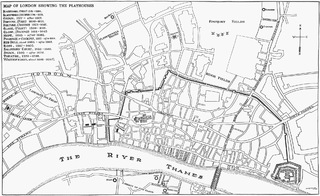
Blackfriars Theatre was the name given to two separate theatres located in the former Blackfriars Dominican priory in the City of London during the Renaissance. The first theatre began as a venue for the Children of the Chapel Royal, child actors associated with the Queen's chapel choirs, and who from 1576 to 1584 staged plays in the vast hall of the former monastery. The second theatre dates from the purchase of the upper part of the priory and another building by James Burbage in 1596, which included the Parliament Chamber on the upper floor that was converted into the playhouse. The Children of the Chapel played in the theatre beginning in the autumn of 1600 until the King's Men took over in 1608. They successfully used it as their winter playhouse until all the theatres were closed in 1642 when the English Civil War began. In 1666, the entire area was destroyed in the Great Fire of London.

Sejanus His Fall, a 1603 play by Ben Jonson, is a tragedy about Lucius Aelius Sejanus, the favourite of the Roman emperor Tiberius.

David Martin Bevington was an American literary scholar. He was the Phyllis Fay Horton Distinguished Service Professor Emeritus in the Humanities and in English Language & Literature, Comparative Literature, and the college at the University of Chicago, where he taught since 1967, as well as chair of Theatre and Performance Studies. "One of the most learned and devoted of Shakespeareans," so called by Harold Bloom, he specialized in British drama of the Renaissance, and edited and introduced the complete works of William Shakespeare in both the 29-volume, Bantam Classics paperback editions and the single-volume Longman edition. After accomplishing this feat, Bevington was often cited as the only living scholar to have personally edited Shakespeare's complete corpus.
Muriel Clara Bradbrook (1909–1993), usually cited as M. C. Bradbrook, was a British literary scholar and authority on Shakespeare. She was Professor of English at Cambridge University, and Mistress of Girton College, Cambridge.

William Shakespeare was an actor, playwright, poet, and theatre entrepreneur in London during the late Elizabethan and early Jacobean eras. He was baptised on 26 April 1564 in Stratford-upon-Avon in Warwickshire, England, in the Holy Trinity Church. At the age of 18, he married Anne Hathaway, with whom he had three children. He died in his home town of Stratford on 23 April 1616, aged 52.

Cowbridge Grammar School was one of the best-known schools in Wales until its closure in 1974. It was replaced by Cowbridge Comprehensive School.
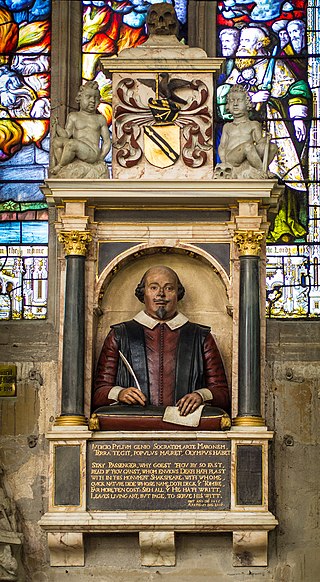
The Shakespeare funerary monument is a memorial to William Shakespeare located inside Holy Trinity Church at Stratford-upon-Avon in Warwickshire, the church in which Shakespeare was baptised and where he was buried in the chancel two days after his death. The monument, carved in pale blue limestone, is mounted on the north wall of the chancel. It has traditionally been identified as the work of the sculptor Gerard Johnson, but this attribution is challenged by Lena Cowen Orlin, who argues that it was more likely modelled from life by Gerard's brother, Nicholas Johnson.
Richard Shakespeare was a husbandman of Snitterfield, Warwickshire, four miles north-northeast of Stratford-upon-Avon, the father of John Shakespeare and the grandfather of William Shakespeare.

Hamnet Shakespeare was the only son of William Shakespeare and Anne Hathaway, and the fraternal twin of Judith Shakespeare. He died at the age of 11. Some Shakespearean scholars speculate on the relationship between Hamnet and his father's later play Hamlet, as well as on possible connections between Hamnet's death and the writing of King John, Romeo and Juliet, Julius Caesar, and Twelfth Night.

The religious views of William Shakespeare are the subject of an ongoing scholarly debate dating back more than 150 years. The general assumption about William Shakespeare's religious affiliation is that he was a conforming member of the established Church of England. However, many scholars have speculated about his personal religious beliefs, based on analysis of the historical record and of his published work, with claims that Shakespeare's family may have had Catholic sympathies and that he himself was a secret Catholic.
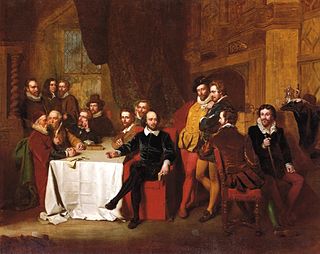
William Shakespeare's style of writing was borrowed from the conventions of the day and adapted to his needs.
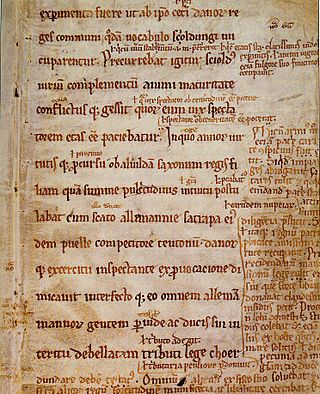
The sources of Hamlet, Prince of Denmark, a tragedy by William Shakespeare believed to have been written between 1599 and 1601, trace back as far as pre-13th century. The generic "hero-as-fool" story is so old and is expressed in the literature of so many cultures that scholars have hypothesized that it may be Indo-European in origin. A Scandinavian version of the story of Hamlet was put into writing around 1200 AD by Danish historian Saxo Grammaticus in his work Gesta Danorum. It is from this work that Shakespeare borrowed to create Hamlet. Similar accounts are found in the Icelandic Saga of Hrolf Kraki and the Roman legend of Lucius Junius Brutus, both of which feature heroes who pretend to be insane in order to get revenge. A reasonably accurate version of Saxo's story was translated into French in 1570 by François de Belleforest in his Histoires Tragiques. Belleforest embellished Saxo's text substantially, almost doubling its length, and introduced the hero's melancholy.
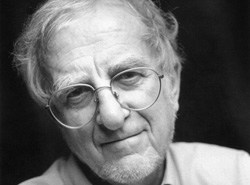
Leonard Hobart Park Honan was an American academic and author who spent most of his career in the UK. He wrote widely on the lives of authors and poets and published important biographies of such writers as Robert Browning, Matthew Arnold, Jane Austen, William Shakespeare and Christopher Marlowe.
Gilbert Shakespeare was a 16th-/17th-century English haberdasher, and a younger brother of playwright and poet William Shakespeare. His name is found in local records of Stratford-upon-Avon and London.

The Shakespeare authorship question is the argument that someone other than William Shakespeare of Stratford-upon-Avon wrote the works attributed to him. Anti-Stratfordians—a collective term for adherents of the various alternative-authorship theories—believe that Shakespeare of Stratford was a front to shield the identity of the real author or authors, who for some reason—usually social rank, state security, or gender—did not want or could not accept public credit. Although the idea has attracted much public interest, all but a few Shakespeare scholars and literary historians consider it a fringe theory, and for the most part acknowledge it only to rebut or disparage the claims.

William Shakespeare's last will and testament was signed on 25 March 1616, just under a month before his death. The document has been studied for details of his personal life, for his opinions, and for his attitudes towards his two daughters, Susanna and Judith, and their respective husbands, John Hall and Thomas Quiney. The best-known passage of the will is the bequest to the wife of his "second best bed". The significance of this phrase is not certain.

Harold Jenkins, FBA is described as "one of the foremost Shakespeare scholars of his century".
Dominic Terence Joseph Bellenger,, also known by his monastic name of Dom Aidan Bellenger, is an English historian and former Benedictine monk and schoolmaster. He was headmaster of Downside School from 1991 to 1995 and later Abbot of Downside Abbey from 2006 to 2014.















